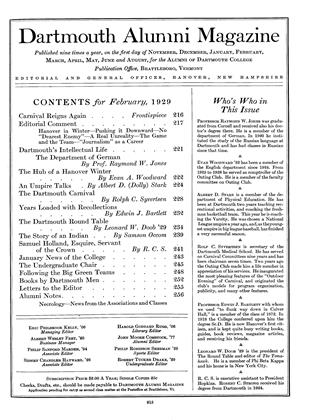The Dartmouth recently published an editorial which is a rather exact reflection of the financial condition of the student in relation to the College. His statement of the increasing wealth of Dartmouth students is borne out by a glance at the campus. It must be remembered that Dartmouth undoubtedly takes a wealthier class than is represented in the average city or middle western public university and that about two per cent of the Americans of college age go to college. There is not much evidence to prove that the remaining ninety-eight per cent are far inferior in intelligence to the fortunate two per cent. Wealth seems to be the deciding factor in the selection of America's student bodies and the citizens of the United States must look to other countries for genuinely free education. Here is the editorial:
Dartmouth seems to be developing very rapidly into a rich man's college. Rising prices on all sides tend to make it harder and harder for the student of limited means to maintain himself here. The cost of living and the cost of learning are rising simultaneously. Within the College, the tuition fee is the outstanding example.
Last winter the ALUMNI MAGAZINE advocated doubling the bill for this item. Then, too, as new dorms go up, rents go up with them. Outside the College there are also factors contributing to the local H.C.L. The worthy institutions on South Main Street (God grant them prosperity!) have done their share. And then Dartmouth men must pay more to their fraternities, deprived as they are of an income through room and board.
But matters are not nearly so bad as they first seem for the student of moderate means. As there are no statistics available on the subject, we cannot even say that the increase in tuition has caused many to turn from choosing Dartmouth. The scholarship funds have managed to keep pace with the tuition pretty well. And while many expensive new dorms are appearing, the College is still retaining enough cheap dorms to meet the demand. Perhaps the greatest difficulty for a poor student is living in contact with those who have more than he, and this is by no means unendurable at Dartmouth with its tendency to suppress, in general, any great show of wealth. One more factor—we have always felt either sympathy or admiration for the student who works his way through in Hanover, with its small town scarcity of steady jobs.
Not so very long ago Dartmouth was a school of low expenses. There are two possible ways to account for the phenomenal change. Perhaps it has arisen from sincere efforts on the part of the administration and trustees to improve the College and do more for the undergraduate. Providing better facilities, erecting new buildings, enlarging and improving the calibre of the faculty all cost money, and when these expenditures creep ahead of the endowment, inevitably the parents of the undergraduate must do the paying.
Then, again, possibly the increase is a result rather than a cause of the influx of students of means. It is entirely possible that the higher classes began to recognize the prestige of Dartmouth before the rise in expenses began. It is notable that in 1925 the administration conducted an investigation into the expenditures of students, and based their subsequent financial policy on the results. This refutes any charges that those in control attempted artificially to limit the College to the wealthy. Very likely it was the appearance of students who could spend freely that raised the prices on South Main Street, too.
It is strange that the standard of living has not kept pace with the cost. Enough has been said in these columns to the effect that we don't eat well. No attempt is made to dress well. We will pass over our low-brow center of amusement. There is no denying that we have some fine dorms; but when one compares Harkness with the prison-like halls of Topliff—every college can't have the endowments of Yale. We have the pleasantest and most comfortable college library in America, at that.
Meanwhile, the attraction of Dartmouth for the well-to-do holds. For some it is merely a matter of prestige, a social asset. Others recognize it as a seat of a liberal education for those above the immediate necessity of preparing for a trade.
 View Full Issue
View Full Issue
More From This Issue
-
 Lettter from the Editor
Lettter from the EditorEditorial Comment
February 1929 -
 Article
ArticleThe Dartmouth Round Table
February 1929 By Leonard W. Doob '29 -
 Article
ArticleThe Dartmouth Carnival
February 1929 By Rolph C. Syvertsen -
 Article
ArticleAn Umpire Talks!
February 1929 By Albert D. (Dolly) Stark -
 Article
ArticleThe Story of an Indian
February 1929 By Samson Occom -
 Class Notes
Class NotesCLASS OF 1923
February 1929 By Truman T. Metzel







